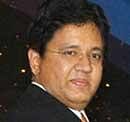
Being scion of a family rooted deep in politics - his father Murasoli was a union commerce and industry minister, his grand uncle M. Karunanidhi is Tamil Nadu chief minister and his younger sibling Dayanidhi is union textiles minister - business was not a natural choice for him.
Neither was he interested in what otherwise remains his extended family's passion. "Politics was discussed over breakfast, lunch, dinner. I had absolutely no interest in it," the 45-year-old, whose Sanskrit first name translates to treasure-trove of art and skill, recollected in an interview to Forbes magazine.
Seeds of his business dreams were sown early. During his student days in Pennsylvania in the mid-1980s where he got a master's in business administration from the University of Scranton, he was awed by the large number of television channels available in the US catering to every possible segment. He was 25 and wanted to start his own bouquet of channels in India.
Back in India in 1987 he took charge of a women's magazine his family was associated with, but his passion remained television - an industry that was then dominated by the state broadcaster, even though some private players like Subhash Chandra's Zee had started emerging in the field.
In 1991, he took the plunge and started a weekly video magazine in Tamil, his mother tongue, but was frustrated by rampant piracy. That's when he finally took the decision to start Sun TV, and began beaming programmes from a Russian satellite.
The big break came in 1998 when India liberalised the satellite broadcast industry and Sun TV was among the first to get a licence. Here, the political connections of the Maran family in the coalition politics of the federal government helped.
Today, his SUN TV Network boasts 20 channels that reach 95 million households in India. It also beams to 27 overseas destinations with large south Indian diaspora, including the US, Canada, Europe, Singapore, Malaysia, Srilanka, South Africa, Australia and New Zealand.
This apart, in its quest to be called a complete media and entertainment company, it runs 45 FM radio stations, two daily newspapers with a circulation of 1.2 million, four magazines and a direct-to-home satellite TV service with 5.5 million subscribers and makes at least eight movies every year.
Little wonder Forbes ranked him number 20 in its list of wealthy Indians with a fortune of $2.3 billion, thanks mainly to his family's 77 percent stake in the business. Otherwise, Maran is ranked 349th in the world.
Maran is also the highest paid chief executive in India, who drew a salary of Rs.37 crore, or around $8 million, last year - same as his wife Kaveri. He also took his company public and it made a stunning debut when it was first quoted at on the Bombay Stock Exchange (BSE) April 26, 2006.
"Sun has unseated media baron Subhash Chandra's Zee Entertainment, which is a national player and twice Sun's size in revenues, to become India's most valuable listed media company, with a market capitalization of $3 billion," Forbes said.
There were setbacks as well, when he and his brother fell apart with the family of his granduncle. Dayanidhi even had to reign as a union minister. But after a year-long estrangement, the two families came together again.
Now, Maran has set his eyes on aviation with SpiceJet. "SpiceJet is among a few Indian airlines running profitably," Jagannadham Thunuguntla, equity head at leading brokerage SMC Capitals told IANS. "It can also start overseas operations and as and when the government eases foreign equity norms on aviation, it will be a strong contender for takeover."
But given the dismal state of this industry in India as well as globally, one wonders if the acquisition will add fresh flavour to Maran's business empire, or emerge too hot to handle.